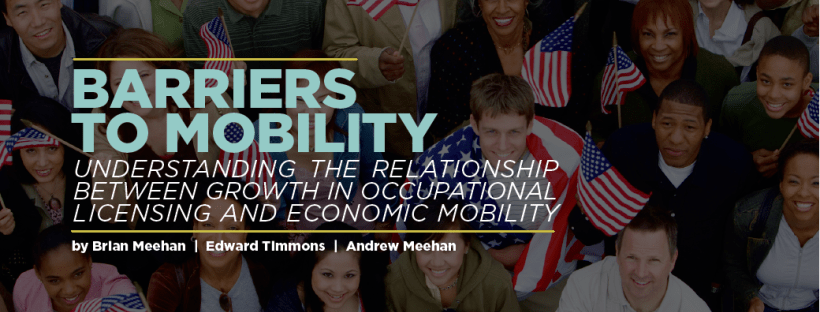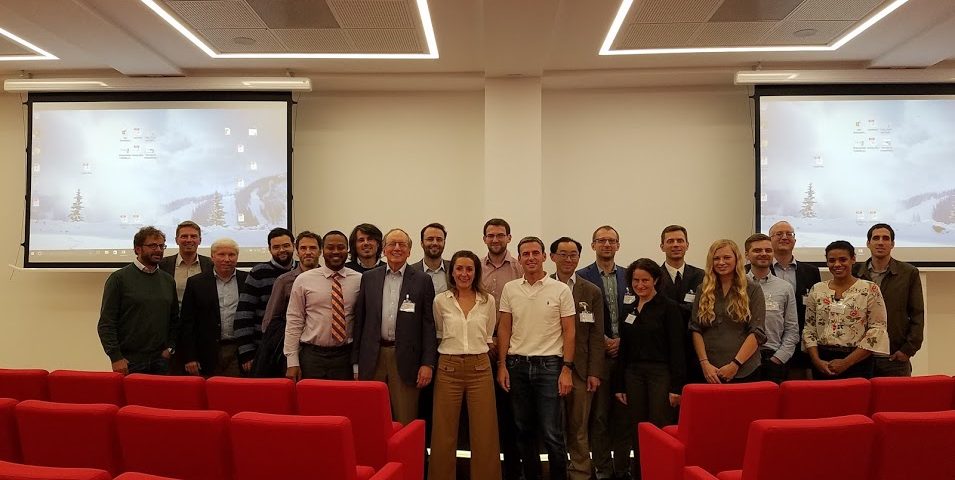
A Call For Papers
September 26, 2017
Barriers to Mobility: Understanding the Relationship between Growth in Occupational Licensing and Economic Mobility
November 20, 2017On October 5th and 6th the Center for the Study of Occupational Regulation sponsored and participated in the Workshop on Occupational Regulation at Collegio Carlo Alberto in Turin, Italy. The two-day conference featured some of the top names in Occupational Licensing across the world. Below are summaries of the presentations. Please feel free contact us for more information on the papers, presentations and conference.
(Photo Credit: Dr. Peter Blair, Clemson University)
Morris Kleiner (University of Minnesota)
Occupational Licensing of UBER drivers (Jointly with Jonathan Hall, Jason Hicks and Rob Solomon)
This study examines Uber in relation to the variety of occupational licensing standards across cities to see if occupational licensing affects the quality of services. His findings show that licensing has small positive effects on measures pertaining to safety and slightly negative to no impact on measures of customer satisfaction.
Edward Timmons (Saint Francis University)
The De-licensing of Barbers in Alabama (Jointly with Robert Thornton)
The licensing and de-licensing of barbers in Alabama is observed as a natural experiment to gauge the impact of occupational regulation. Results suggest that licensing had been restricting competition in the market for hair-cutting services in Alabama.
Andreas Haupt (Karlsruhe Institute of Technology)
Institutional Variation in Occupational Licensing and Wage Inequality in the USA and Germany (Jointly with Nils Witte)
This study assesses the impact of occupational licensing on wage inequality in the USA and Germany, using worker-level microdata and multivariate quantile regression techniques. The findings are that rules and functioning of the licensing system act to compress the wage distribution in Germany and for the USA; occupational licensing is instead a driver of wage inequality.
Ida Drange (Oslo and Akershus University)
The role of Occupational Regulation for the Ethnic Pay gap. An Inquiry of Company Wage Levels
This study explores four hypotheses on union density and wage gaps (1) union memberships reduce the wage gap between immigrants and majority colleagues (2) union density increases the wages of non-organized immigrants (3) the wage gap between immigrants and majority colleagues is lower in licensed jobs and (4) a high percentage of licensed workers increases the wages of unlicensed immigrants. It is found that (1) licensure is associated with higher wage levels (2) union density only yields higher wages to union members if there is an organized collective at the workplace and (3) licensure and unionization ‘protect’ non-Western immigrants from wage discrimination at the workplace.
Mario Pagliero (University of Turin and Collegio Carlo Alberto)
Occupational Licensing, Labor Mobility, and the Unfairness of Entry Standards (Jointly with Paolo Buonanno)
An empirical study on the number of participants and successful candidates in the written and oral Italian bar exams across districts reveals (1) extreme heterogeneity across markets in admission outcomes, (2) unfair (discriminatory) admission procedures, and (3) inefficient mobility of workers.
Yair Osheroff (The Hebrew University of Jerusalem)
The Political Economy of Occupational Licensing in Israel: A Comparative Study of the Licensing of Accountancy and Physical Therapy
This study looks at conceptualizing OAR (Occupational Access Regulation) and explains the expansion of occupational licensing in Israel focusing on accountancy and physical therapy. Occupational licensing varies in terms of restrictiveness and the paper explores the rationale for occupational licensing. Occupational licensing can be initiated by practitioners, but the paper also discusses the underexplored thesis of occupational licensing being in the best interest of the state.
Frédéric Lagneaux (EU Commission)
Occupational Regulation in the EU: Policy Developments
This report examines the regulation of the service industry in Europe. Close to 50 million people work in regulated professions in the EU (i.e. 22% of the EU labour force). Studies suggest the occupational regulation reform could lead to improved productivity and generate job growth.
Davud Rostam-Afschar (Universitaet Hohenheim)
Regulatory Effects on Architects and Civil Engineers: Evidence from Germany
Architects and construction engineers have a high share of entrepreneurs and are both very heavily regulated in Germany. The regulatory effects on entrepreneurial activity are observed through these occupations and the effects are measured. Preliminary results show higher market concentration for architects and no stronger effects for engineers.
John Barrios (Chicago Booth School of Business)
Occupational Licensing and Accountant Quality: Evidence from LinkedIn
The 150-hour Rule is observed to examine the effects of mandatory occupational licensure on the individual quality of Certified Public Accountants (CPAs). Findings suggest that restrictive licensing laws reduced the supply of new CPAs while failing to increase the quality of CPAs as measured by their labor market outcomes.
Peter Blair (Clemson University)
Occupational Licensing Reduces Racial and Gender Wage Gaps: Evidence from the Survey of Income and Program Participation (jointly with Bobby W. Chung)
This study looked at three research questions (1) Is there heterogeneity in licensing premium by race and gender? (2) Does heterogeneity in the licensing premium reduce or exacerbate the racial wage gaps? (3) What are the welfare implications of heterogeneity on licensing premia for various demographic subgroups? The authors find that (1) licensing reduces racial wage gap between black men and white men by 69% (2) licensing reduces the gender wage gap between women of both races and white men by 42% and (3) the results are robust after controlling for selection bias and considering other competing explanations.
Maria Koumenta (Queen Mary University)
Occupational Regulation in the European Union: Coverage and Wage Effects (Jointly with Mario Pagliero)
A study using newly collected EU-SOR data estimates (1) prevalence of occupational regulation in the EU (2) licensing wage premium and (3) the impact of licensing on wage inequality. The study finds that 22% of EU workers have a license, there is a licensing wage premium of 7.5% in the EU that is heterogeneous across occupations, that licensing wage premiums are larger than certificate premiums, and that licensing increases wage inequality.


